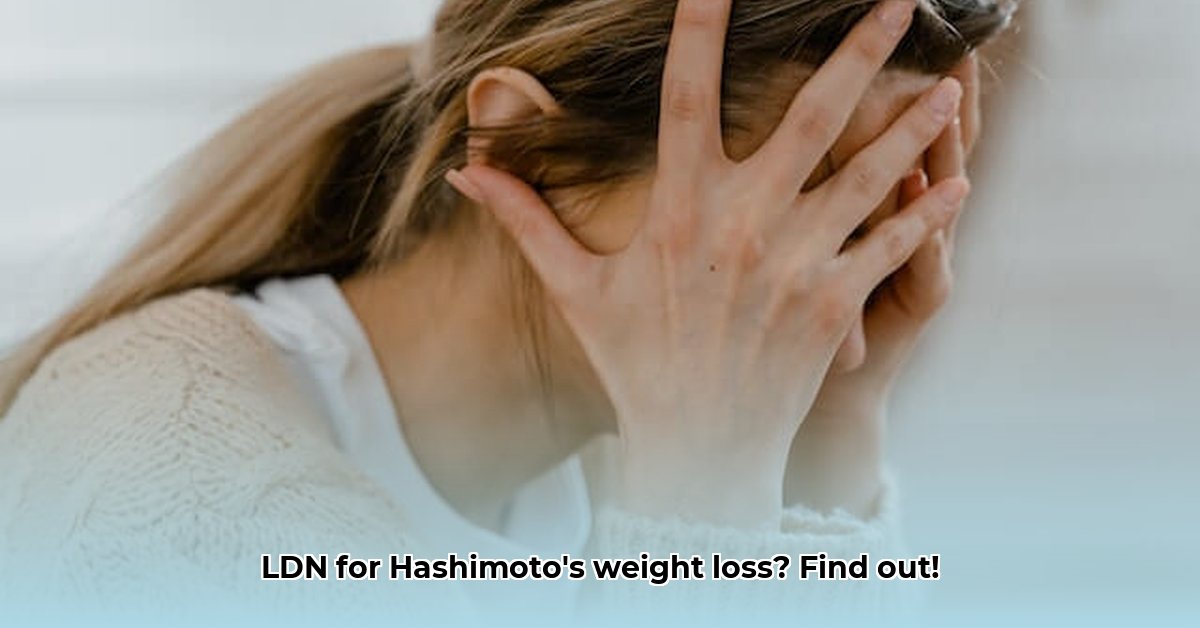
Low-Dose Naltrexone (LDN) and Hashimoto's Thyroiditis: A Review
Hashimoto's thyroiditis, an autoimmune disease affecting the thyroid gland, frequently presents with unexplained weight gain, alongside fatigue and other debilitating symptoms. Many individuals with Hashimoto's struggle to lose weight despite dietary changes and exercise. Low-dose naltrexone (LDN), typically used at doses significantly lower than those employed in opioid addiction treatment, has garnered attention as a potential aid in weight management for Hashimoto's patients. However, the effectiveness of LDN for this purpose remains a subject of ongoing debate and research. This review examines the current evidence, potential mechanisms, and risks associated with LDN use in Hashimoto's.
Understanding Hashimoto's and Weight Gain
Hashimoto's disrupts the thyroid's hormone production. These hormones regulate metabolism, and their imbalance can lead to a slowed metabolic rate, contributing to weight gain, fatigue, and digestive issues. This weight gain often proves resistant to conventional weight-loss strategies. The complex interplay between thyroid function, inflammation, and metabolic processes makes weight management particularly challenging for those with Hashimoto's. Is LDN a viable solution? The existing evidence is currently inconclusive.
Low-Dose Naltrexone (LDN): A Closer Look
LDN, administered at doses of 1.5–4.5 mg, is an "off-label" use for Hashimoto's. This means its application to Hashimoto's weight loss hasn't received formal approval from regulatory bodies like the FDA. The proposed mechanism of action centers on LDN's interaction with opioid receptors, potentially modulating the immune system and reducing inflammation. However, the exact processes through which LDN might influence weight loss remain poorly understood. Does the evidence support its efficacy?
The Evidence: A Critical Appraisal
The effectiveness of LDN for Hashimoto's weight loss is largely supported by anecdotal evidence, with many individuals reporting positive outcomes. However, robust clinical trials specifically evaluating LDN's impact on weight management in individuals with Hashimoto's are lacking. Existing studies often involve small sample sizes and varying methodologies, making it difficult to draw definitive conclusions. The variability in individual responses to LDN further complicates the interpretation of the available data. Does this mean LDN is ineffective? Further research is crucial.
Potential Mechanisms and Unknowns
The potential mechanisms through which LDN might influence weight loss in Hashimoto's are still under investigation. It’s hypothesized that LDN's modulation of the immune system, potentially reducing inflammation and impacting cytokine levels, may contribute to improved metabolic function. However, other factors—such as gut health and the presence of Candida—could also play significant roles in determining LDN’s effectiveness, if any. This area requires significantly more research.
Weighing the Benefits and Risks
While anecdotal evidence suggests potential benefits like increased energy levels, reduced inflammation, and weight loss in some patients, the lack of rigorous scientific data necessitates caution. Potential side effects, though generally mild, include vivid dreams, fatigue, and nausea. The possibility of drug interactions also warrants careful consideration, especially with opioid medications and alcohol. The absence of robust clinical trials poses a significant limitation in assessing the true benefit-risk profile of LDN for Hashimoto's weight loss. What should you do?
A Comprehensive Approach to Hashimoto's Management
Managing Hashimoto's typically requires a holistic approach. Consider LDN as a potential additional strategy, not a standalone solution. A healthy, balanced diet, regular exercise, stress management techniques, and consistent medical supervision are all crucial components. LDN shouldn’t be viewed as a quick fix; it’s one aspect of a comprehensive, long-term management plan.
Actionable Steps: A Roadmap for Discussion with Your Doctor
Before considering LDN:
- Consult your physician: Discuss your symptoms, current medications, and interest in LDN with your endocrinologist.
- Thorough evaluation: Your doctor will assess your overall health and determine if LDN is appropriate for your situation.
- Close monitoring: Regular blood tests and symptom tracking are essential to monitor LDN’s impact and address any potential side effects.
- Gradual dose increase (if needed): Your physician may recommend starting with a low dose and gradually increasing it under careful supervision.
- Open communication: Maintain ongoing communication with your doctor throughout the treatment.
Key Takeaways:
- LDN is an off-label treatment for Hashimoto's weight loss, lacking robust clinical trial support.
- Anecdotal reports suggest potential benefits, but more research is needed to confirm efficacy.
- Individual responses to LDN vary greatly.
- Potential side effects, although typically mild, exist.
- A comprehensive approach—including diet, exercise, and stress management—is essential for Hashimoto's management.
Disclaimer: This information is for educational purposes only and does not constitute medical advice. Always consult your healthcare provider before starting any new treatment, including LDN.